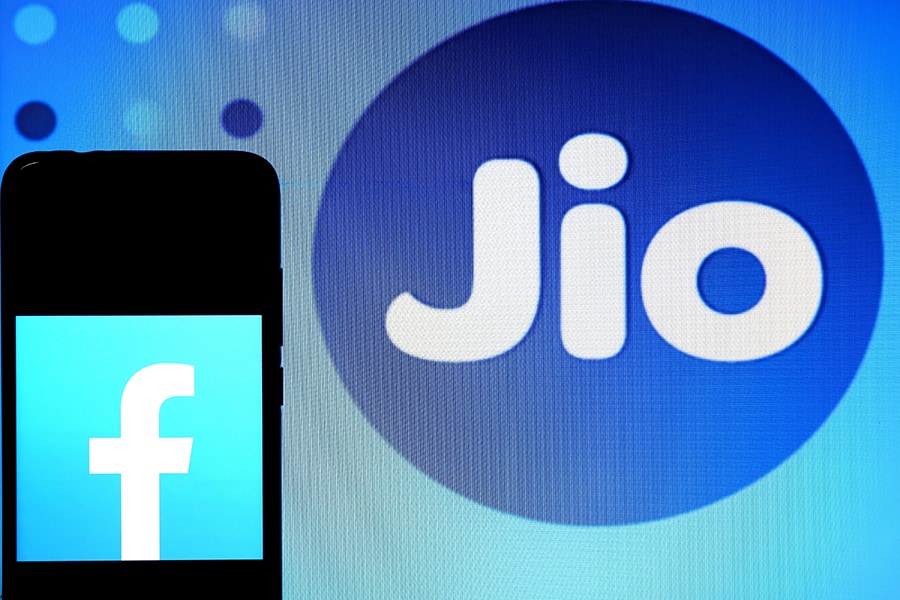
With massive investment in Jio Platforms, Facebook seeks strong foothold in India
With its $5.7 billion investment, Facebook aims to tap into India's internet ecosystem on the back of Jio's 388 million wireless subscribers and over 400 million WhatsApp users
 Image: Shutterstock
Image: ShutterstockAfter previous attempts such as Free Basics brought it lacklustre results, Facebook has taken a more direct approach to becoming a much bigger player in the internet ecosystem of India—a market it sees as vital to its future growth.
On Tuesday, the Silicon Valley based social networking giant announced it had invested $5.7 billion (Rs. 43,574 crore) in Reliance Industries’s Jio Platforms. The move gives Facebook a chance to tap into the ecosystem of internet-driven brands that Reliance is building, from entertainment to mobile commerce. This ecosystem is accessed by some 388 million subscribers of Jio Infocomm, the biggest wireless provider in India.
With its investment, Facebook also becomes the single largest minority shareholder in Jio Platforms. It gets close to 10 percent of Jio Platforms at a pre-investment valuation of nearly $66 billion. This position also allows it to find synergies between Jio’s offerings and WhatsApp. Facebook owns WhatsApp, India’s biggest instant messaging platform, used by over 400 million subscribers, cutting across mobile services providers. WhatsApp is soon expected to launch a payments feature in India.
Facebook shares rose as much as 6.5 percent to $181.86 in morning trading on the Nasdaq exchange in the US.
“India is in the midst of one of the most dynamic social and economic transformations the world has ever seen, driven by the rapid adoption of digital technologies,” Davis Fischer, chief revenue officer and Ajit Mohan, VP and managing director for India at Facebook, said in a blogpost.
In just the past five years, more than 560 million people in India have gained access to the internet, they noted. “Our goal is to enable new opportunities for businesses of all sizes, but especially for the more than 60 million small businesses across India,” Fischer and Mohan added.
India’s small and medium sized businesses account for a majority of jobs in the country. One focus area of Facebook’s collaboration with Jio will be creating new ways for people and businesses to work more effectively in the growing digital economy in the country. “For instance, by bringing together JioMart, Jio’s small business initiative, with the power of WhatsApp, we can enable people to connect with businesses, shop and ultimately purchase products in a seamless mobile experience,” the Facebook executives said in their blogpost.
In 2016, Facebook sought to offer access to a clutch of popular websites free of cost to its users, but that move fell foul of Indian regulators, who found it went against norms of net neutrality. Free Basics didn’t take off. Since then, WhatsApp has been more in the news, and especially for its plans to introduce a payments service in India. WhatsApp has said that it is close to meeting all of India’s regulatory requirements to launch such a service.
The service, once launched will pit WhatsApp and Facebook against the Google Pay service; Alibaba-backed One97 Communications, which operates Paytm, currently the largest mobile wallet provider in India; and PhonePe, the payments service offered by Flipkart, a Walmart unit, among the leading such providers.
Ecommerce play
“Both Reliance and Facebook are looking at ecommerce as the next big opportunity, and both players have some gaps. Facebook has the technology platform but not the men on the ground, which Reliance can provide, therefore for them this is a step in the right direction,” Satish Meena, senior forecast analyst at Forrester, says. “They realise that just having a Facebook Messenger or WhatsApp platform isn’t going to get consumers to start buying on the platform. It requires someone to execute those orders. That’s why before this, they invested in Meesho, a social commerce startup, but that was a small investment.”
Facebook has all the necessary tools that WeChat is using in China—from a payment gateway to messaging to Instagram. Now, it wants to integrate all these features and have a backend partner via Reliance and build an ecommerce offering. For Facebook, this could be something bigger than WeChat, which is limited to China. On the other hand, if the partnership with Reliance succeeds, then this becomes a model that Facebook can export to many other markets around the world, whereas WeChat is mostly limited to China, Meena adds.
For Reliance, they are looking for access to customers and kirana stores, and WhatsApp gives them that opportunity. Now, almost 400 million customers use the app every day, including small businesses. They also already have their own stores and warehouses from which they can start fulfilling orders. Therefore, for them, Facebook offers a powerful tech platform on top of which they can build their online grocery business.








